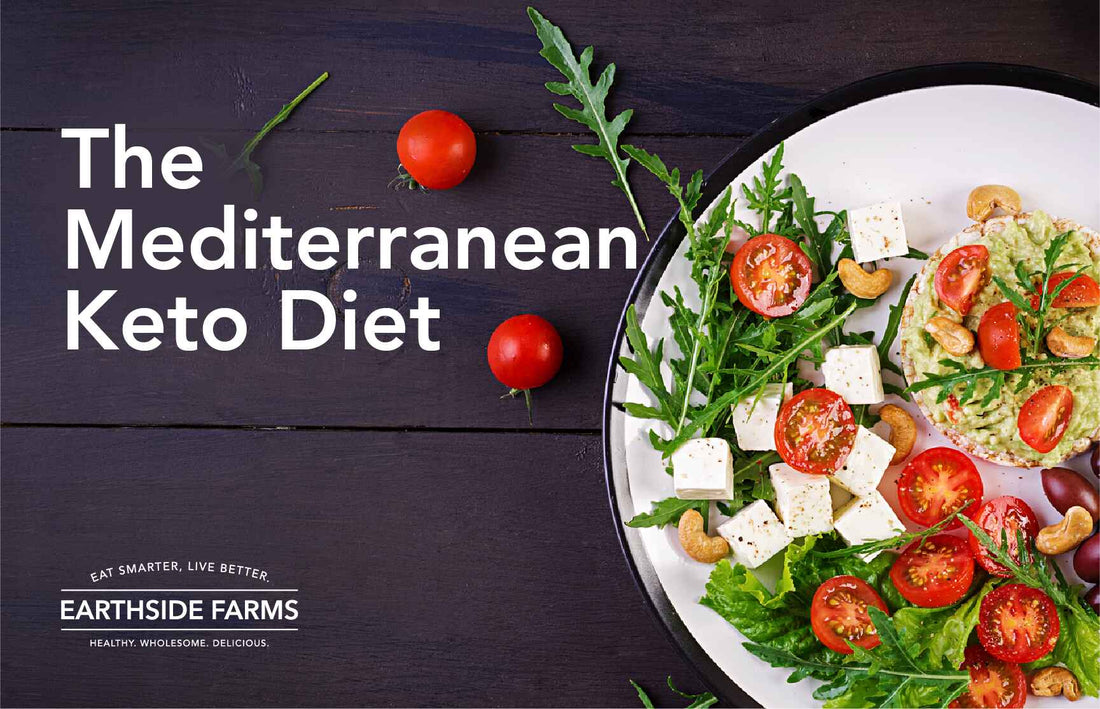Are you craving a healthier, more sustainable way of eating that combines the best of two popular diets?
The Mediterranean keto diet might be exactly what you’re looking for.
It perfectly balances those seeking weight loss, better energy, and improved heart health.
But is it really the answer to your health goals?
Can you enjoy delicious Mediterranean foods while staying in ketosis?
In this article, we’ll explore what makes the Mediterranean keto diet a winning choice for health-conscious eaters, discuss its benefits, and guide you through how to get started.
Let’s jump in.
What Is the Mediterranean Keto Diet?
The Mediterranean keto diet combines the low-carb, high-fat principles of the keto diet with the wholesome, nutrient-rich foods of the Mediterranean Diet.
On the Mediterranean keto diet, you’ll focus on:
Healthy Fats
Olive oil, avocado oil, and fatty fish like salmon provide the good fats your body needs.
Protein
The primary protein sources are seafood, poultry, and eggs, while red meat is enjoyed only in moderation.
Low-Carb Veggies
Leafy greens, broccoli, cauliflower, and zucchini are your go-to for filling meals without the carbs.
Benefits of the Mediterranean Keto Diet
Let’s break down some of the key health advantages of the Mediterranean keto diet:
Supports Weight Loss
This diet is perfect for those seeking to shed a few pounds.
By limiting carbohydrates and prioritizing healthy fats, your body enters ketosis, burning fat for fuel instead of carbs.
The Mediterranean keto diet helps maintain this fat-burning state, leading to consistent weight loss.
Plus, with its focus on whole, unprocessed foods, you also nourish your body while losing weight.
Improves Heart Health
The Mediterranean keto diet focuses on healthy fats like olive oil, avocados, and fish, which are proven to reduce bad cholesterol (LDL) and raise good cholesterol (HDL).
These fats also reduce inflammation, a key factor in heart disease.
Cutting out processed foods and refined sugars reduces your risk of hypertension and improves blood flow.
Better Blood Sugar Control
Both the Keto and Mediterranean diets are known for their ability to stabilize blood sugar levels.
On the Mediterranean keto diet, you cut out sugar and high-carb foods that cause spikes in blood sugar, helping to manage or reverse type 2 diabetes and prevent insulin resistance.
Boosts Brain Function
Healthy fats like olive oil and fatty fish are critical for brain health.
The Mediterranean keto diet provides ample amounts of these fats, which have improved cognition and reduced the risk of neurological disorders like Alzheimer's and Parkinson's.
Plus, ketones, the byproducts of ketosis, have been linked to enhanced brain function and focus.
Reduced Inflammation
Both diets emphasize nutrient-dense, anti-inflammatory foods like fish, leafy greens, and olive oil.
Together, these foods reduce chronic inflammation, a leading factor in arthritis, cardiovascular disease, and autoimmune disorders.
What Foods Are Allowed on the Mediterranean Keto Diet?
Here is a comprehensive list of all the foods allowed in the Mediterranean keto diet:
Proteins
-
Poultry like chicken, turkey
-
Eggs, a staple protein source
-
Wild game like elk, bison (occasionally)
-
Red meat like beef, pork, and lamb (in moderation)
-
Fish like salmon, sardines, mackerel, tuna, anchovies, and shellfish
-
Seafood like shrimp, crab, lobster, clams, oysters, squid, and octopus
Healthy Fats
-
Butter is to be taken in moderation
-
Olives, whole olives, are both a fat source and a snack
-
Coconut oil & MCT oil for variety and additional healthy fats
-
Olive oil, extra virgin olive oil (EVOO), as the primary fat source
-
Avocado & avocado oil, both the fruit and its oil, are encouraged
-
Seeds like chia seeds, flax seeds, sesame seeds, and pumpkin seeds
-
Nuts like almonds, walnuts, hazelnuts, pistachios, & macadamia nuts
Dairy (Full-Fat & Fermented)
-
Butter, allowed in small amounts
-
Greek yogurt, full-fat, unsweetened Greek yogurt
-
Cheeses like feta, halloumi, and other fatty cheeses (in moderation)
Vegetables (Low-Carb, Non-Starchy)
-
Salad greens like arugula, romaine, and mixed greens
-
Leafy greens like spinach, kale, arugula, Swiss chard, lettuce
-
Cruciferous vegetables like broccoli, cauliflower, Brussels sprouts
-
Other low-carb veggies like zucchini, eggplant, artichoke, tomatoes,
-
Also, bell peppers, cucumbers, mushrooms, asparagus, fennel, and green beans
-
Herbs & spices like garlic, black pepper, paprika, chili powder, basil, oregano, parsley
Fruits (Low-Sugar, in Moderation)
-
Avocado, treated as both a fruit and a fat source
-
Citrus, like lemons and limes, mainly for flavoring
-
Berries like strawberries, blueberries, raspberries, blackberries
Other Allowed Foods
-
Mushrooms, all varieties
-
Seeds like chia, flax, sesame, and linseed
-
Keto-friendly sweeteners like stevia, monk fruit
-
Vinegars like balsamic, red wine, apple cider, etc.
-
Dressings like pesto, aioli, vinaigrette, and chimichurri (made with approved oils)
How to Combine the Mediterranean Diet with Keto
Combining the Mediterranean diet with keto focuses on nutrient-dense, low-carb foods while maintaining the heart-healthy principles of the Mediterranean lifestyle.
Focus on Healthy Fats
Healthy fats are essential for both diets.
Focus on olive oil and avocados for monounsaturated fats.
These fats improve heart health and support ketosis.
Extra virgin olive oil (EVOO) is your primary fat source. Coconut oil and MCT oil also support ketosis and brain function.
Limit Carbs, But Keep the Mediterranean Vegetables
Limit carbs but include low-carb vegetables.
Replace whole grains and legumes with leafy greens, cruciferous vegetables, and zucchini.
These provide vitamins and fiber while keeping carbs low.
Moderate Protein Intake
Keep protein moderate.
Focus on fatty fish, seafood, and poultry.
Salmon, mackerel, and sardines are great sources of protein and omega-3s.
Enjoy chicken and turkey in moderation.
Enjoy Dairy in Moderation
Dairy is allowed but in moderation.
Opt for full-fat Greek yogurt and cheese like feta and halloumi.
Keep portions in check to avoid excess carbs.
Keep Herbs, Spices, & Flavoring Simple
Use herbs and spices like garlic, basil, and oregano to add flavor without carbs.
Garlic reduces inflammation and boosts immunity.
Fresh herbs provide flavor and health benefits.
Mediterranean Keto Snacks for Maximum Flavor
The Mediterranean keto diet supports weight loss and heart health by focusing on healthy fats, moderate protein, and low-carb vegetables.
Earthside Farms offers several products that fit seamlessly into this lifestyle, including:
Stay on track with your health goals without compromising on taste.
Explore more at Earthside Farms.
Frequently Asked Questions
Here are some FAQs on this topic
Is there a keto version of the Mediterranean diet?
Yes, the Mediterranean keto diet combines the low-carb, high-fat principles of the Keto diet with the heart-healthy, plant-forward foods of the Mediterranean diet.
It focuses on healthy fats like olive oil, avocados, and fatty fish, while limiting carbohydrates from grains and starchy vegetables.
What is the Mediterranean keto diet for beginners?
For beginners, the Mediterranean Keto diet emphasizes eating low-carb vegetables, lean proteins like fish and poultry, healthy fats from olive oil and nuts, and limited dairy and red meat.
What is not allowed on a Mediterranean diet?
The traditional Mediterranean diet excludes highly processed foods, refined sugars, and excessive red meat. Avoid grains, legumes, starchy vegetables, and high-carb fruits to maintain ketosis.
Do you lose more weight on a keto or Mediterranean diet?
Both diets promote weight loss, but the keto diet is often more effective for rapid weight loss due to its strict carbohydrate restrictions. The Mediterranean Keto approach offers the benefits of both.


